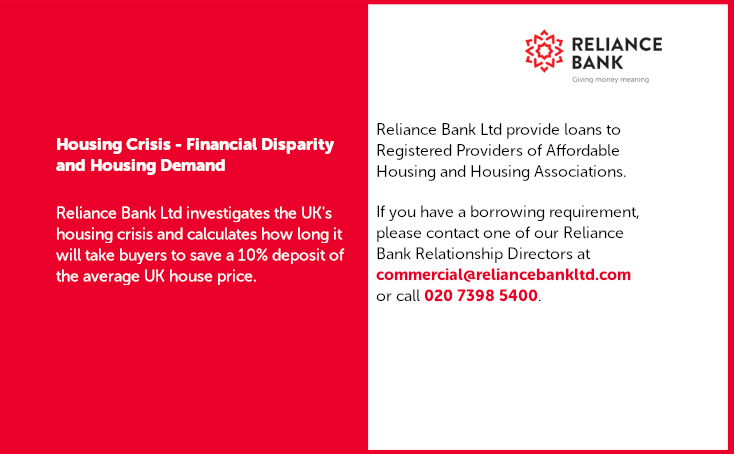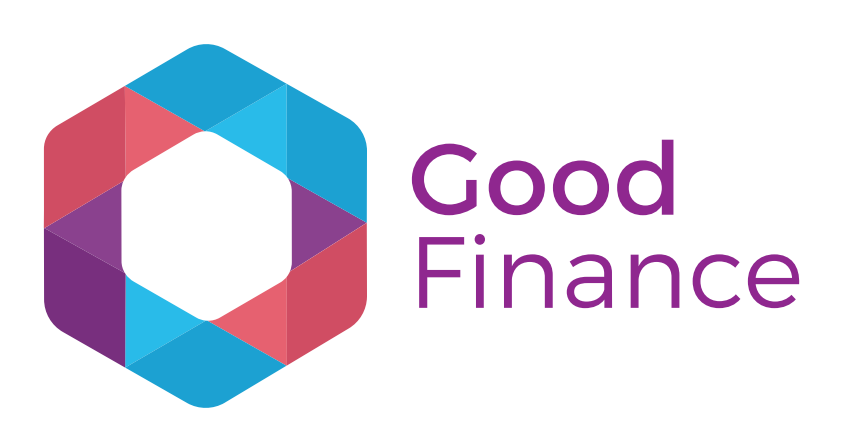
Housing Crisis – Financial Disparity and Housing Demand – Reliance Bank Ltd
There are many reasons why housing unaffordability has become a prominent problem in the UK. Since the beginning of the Covid-19 pandemic, housing prices have increased substantially, making it more difficult for first time buyers to get on the housing ladder. In fact, in the last year alone, UK average house prices increased by 10.6% to August 2021, up from 8.5% in July (1).
That being said, household savings have also risen, on average, since the start of the Covid-19 pandemic, according to a survey conducted by The Bank of England (2). The research found, however, that the accumulation of savings was concentrated among wealthier households, creating further financial disparity between low-income and high-income households. While 28% of total respondents had accumulated additional savings as a result of the pandemic, 20% had depleted their savings according to the survey conducted by Bank of England.
Breaking these figures down, 42% of high-income employed households saved more during the pandemic, compared to only 22% of low-income employed households – it is becoming more difficult for low-income households to get on the property ladder.
Additionally, increased demand and low supply has also caused housing prices to soar. According to Danielle Hale, Chief Economist at realtor.com (3), housing supply has dropped by 53% compared to last year (2020), adding that, “median listing prices grew at 18.7 percent over last year”, emphasising that affordability will be a growing challenge for home buyers, as house prices climb. Essentially, these figures highlight that it’s becoming increasingly difficult for first-time buyers/renters, especially those from low-income households, to buy property.
Government Initiatives
As a result of the ongoing pandemic and its impact on people’s finances, the government launched a number of initiatives during the Covid pandemic to help buyers get on the housing ladder. But was it enough?
The Stamp Duty holiday (4), for example, was unveiled in July 2020 for England and Northern Ireland to help boost the property market and support buyers whose finances were affected by the Covid-19 pandemic. It ended on 30th September 2021.
While this temporary tax exemption has been beneficial, allowing many buyers to save up to £15,000, not everyone can afford to buy a house due to increasing prices. Furthermore, the potential savings gained from the stamp duty holiday led to a buying frenzy, which in turn, led to a rise in house prices.
So, while the stamp duty holiday initiative boosted the property market, it also made it more difficult for low-income households to purchase property due to increasing house prices.
The following factors have contributed to an unbalanced housing market:
According to the Affordable Housing Commission (5), there are several factors causing financial disparity between low-income and high-income households, and overall housing unaffordability in the UK. These factors include:
1. The sharp decline of social housing, propelled by the introduction of the ‘Right to Buy’ scheme in the 1980’s.
The Right to Buy scheme allowed tenants to buy their council house for between a third and a half of market value, or three-quarters for council flats. This meant that social homes were being sold and not replaced as rates of social housing construction dropped steeply over subsequent decades. In fact, around 2.8 million council houses (6) had been sold in the UK by the mid-2000s, mostly under Right to Buy.
2. Rising rents
Private rental prices paid by tenants in the UK rose by 1.3% in the 12 months to September 2021, unchanged since July 2021, according to the ONS Index of Private Housing Rental Prices (7) (IPHRP). This makes it more difficult for low-income households to save enough money to afford to buy a home.
3. Social tenants have halved while the number of private renters have doubled.
The proportion of UK households living in the private rental sector increased from 9.5% to 18.6% while the proportion living in the social rental sector decreased from 27.1% to 13.7% between 1982 and 2017 (8) – meaning that the housing market has become unbalanced.
4. Nearly 5 million households pay over a third of their income in rent.
Nearly 5 million households (9) pay over a third of their income in rent while almost a quarter of private renters pay more than 40%. While affordability is an issue across the UK, it’s more prevalent in London and the South East.
5. One in 3 low-income earners are having to borrow to pay their rent.
According to research, one in three low-income renters in Britain have had to borrow money to cover their rent (9). Adding to this, many renters can’t save enough money for a deposit without relying on ‘the bank of Mum and Dad’. In fact, those without parental property wealth are approximately 60% less likely to be homeowners than people whose parents are homeowners (9).
6. Overcrowding and under-occupation are both rising simultaneously.
According to the Economist, “some 746,000 homes were overcrowded [in 2018], meaning that there were not enough bedrooms for each single adult, couple or pair of children to have one to themselves. That was a 14% increase on a decade before. Meanwhile the number of homes that were under-occupied, meaning that they had at least two spare bedrooms, also increased, by 10%, to 8.6m (9).”
So, how long do I need to save for?
With an ongoing housing crisis in the UK, young people are continually being told to save as much as they can for a deposit to buy a house in the future. The idea is that the larger your deposit, the better mortgage rate you will get. But how long will you have to save to buy your first property whilst paying rent at the same time?
Despite house prices increasing, it is possible to get on the property ladder. To help, we’ve calculated how long, on average, it will take you to save up a 10% deposit using the average UK house price of £264,244 (as of August 2021) (10). No matter how much you earn, here’s an average estimation of how long it will take you to save £26,424 (which is 10% deposit) of the average house price of £264,244, based on how much you save per month.
| Monthly saving (£) | Number of months to save 10% deposit | Number of years to save 10% deposit |
|---|---|---|
| £100 | 264 | 22 |
| £200 | 132 | 11 |
| £300 | 88 | 7.3 |
| £400 | 66 | 5.5 |
| £500 | 53 | 4.4 |
| £600 | 44 | 3.6 |
| £700 | 38 | 3.1 |
| £800 | 33 | 2.7 |
| £900 | 29 | 2.4 |
| £1000 | 26 | 2.1 |
The UK average salary is £31,772 per year (11) (for the tax year ending April 2021), which means the monthly take home rate is approximately £2,647 (before tax) and £2,106 (after tax). If you earn around the average salary, you could potentially reach the required deposit of 10% after 2-3 years of saving at least £800 per month.
Understandably, this is not a ‘one size fits all’ scenario – low-income households will struggle to accumulate the 10% deposit as house prices continue to soar.
Here is a summary in numbers of The Regulator of Social Housing – Value for Money Report (12):
1) Compared to previous years, reinvestment in to existing and new social housing stock has risen to its highest level across all quartiles; according to the Regulator of Social Housing (RSH) value for money (VfM) report. The VfM report for the year ending 31st March 2020, found that reinvestment (as a proportion of asset values) increased 15.7% at the median level, reaching 7.2%, this compares with 6.2% in 2019 and 6% in 2018.
2) Total reinvestment in new or existing social housing properties for rent increased from £9.6bn in 2019 to £12.2bn in 2020.
3) Over the last three years, capitalised major repairs, total repairs and maintenance costs increased by 15% to £5.7bn. Overall, more than half of the sector reported an increase in repairs and maintenance spend of greater than 5%. The increase in maintenance and repair costs is partially attributable to building safety spend and health and safety compliance costs.
4) The average Headline Social Housing cost (HSHC), continues to increase across all quartiles – the median cost per unit has increased by 4% to £3,830 per unit – reflecting a range of factors including expenditure on building safety.
5) While the sector remains committed to future growth, some areas of the country have seen a slowdown in market sales which means providers have increased borrowing to deliver new social housing supply.
The RSH VFM Standard requires providers to annually report on their performance against a suite of measures defined by the regulator. Reporting can provide valuable assurance from providers as to how they are meeting the requirements of the Standard in terms of decision making and strategic approach, as well as making the sector more transparent and accountable to its tenants and to other stakeholders.
The unprecedented impact of Covid-19 along with a growing range of competing requirements have all increased demands on social housing providers. This means that boards will need to navigate an extremely difficult business environment, pivot quickly in response to emerging scenarios and think beyond the immediate challenges.
To rebalance the housing market we need a lot more genuinely affordable homes.
Reliance Bank Ltd has proudly supported the social housing sector for many years. Reliance Bank Ltd provide funding to Registered Providers of Affordable Housing and Registered Providers of Social Housing, so that they can provide more affordable homes for people on low incomes.
See our case study below explaining how Reliance Bank Ltd provided funding to a Registered Provider of affordable housing that specialise in high quality Shared Ownership homes:
Reliance Bank – Where money helps people own a share of their own home
A Registered Provider of affordable housing, under the governance of the Regulator of Social Housing (RSH). They specialise in high quality Shared Ownership homes, an affordable home ownership scheme which makes it easier for buyers to get on the property ladder. Shared Ownership helps first time buyers to secure their new home as it can reduce the deposit amount required. The Registered Provider wanted to acquire more properties to add to their Shared Ownership portfolio in the south of England from outer London all the way down to Southampton.
Impact
Reliance Bank helped them release cash to grow their portfolio and provided a commercial loan over a 30 year period that enabled them to secure 24 apartments assisting in their ambition to grow its portfolio to 2,000 homes within the next five years. The new apartments have made it easier for first time buyers to get on the property ladder, that may not have ordinarily been able to do so on the open market. These new Shared Ownership properties have helped people to own a share of their own home and they can staircase to full ownership over time.
Registered Provider of affordable housing said:
“We have been delighted with the approach Reliance Bank took to working alongside us. All the way through they have been diligent and ensured full understanding of the processes of working in the shared ownership market. We consider our ongoing relationship with Reliance Bank Ltd to be a very strong and successful one.”
To find out more about our Business Loans visit: Click here
If you are Registered Provider of Affordable Housing or Housing Association and have a borrowing requirement, contact one of our Relationship Directors at commercial@reliancebankltd.com or call 0207 398 5400.
Reliance Bank are proud to support Shared Ownership Mortgages – for more information click on:
About Reliance Bank
Helping good people do great things with money
Reliance Bank Ltd has been at the forefront of social impact banking since 1890, when we were formed by William Booth the founder of The Salvation Army. Reliance Bank are proud of its shareholder The Salvation Army International who help people whose lives have been affected by emergencies, disasters, poverty and social inequality internationally.
Power to change lives for the better
We don’t see money as an end in itself. But we do know that money has the power to change lives for the better. In the right hands, it can be a force for good. That’s why we prioritise our business lending to organisations delivering positive social impact in the UK and specifically the following sectors:
• Health and Social Care
• Social Housing
• Social Enterprises
• Education
• Faith Organisations; Churches, Religious Orders
• Charities
• Community, Arts, Heritage, Sports
To find out more about our Business Loans visit: Click here
If you are a Registered Provider and have borrowing requirements, please contact one of our Reliance Bank Relationship Directors at commercial@reliancebankltd.com or call 0207 398 5400.
Reliance Bank Limited. All rights reserved. Registered in England. Registration no. 68835. Reliance Bank Limited is authorised by the Prudential Regulation Authority and regulated by the Financial Conduct Authority and the Prudential Regulation Authority. Financial Services Register number 204537. Reliance Bank Limited, Faith House, 23 – 24 Lovat Lane, London EC3R 8EB. Telephone: 0207 398 5400.
Footer – Notes to editor:
Sources for statistics used in the article:
1) Source – ONS – correct as at August 2021
2) Source – Bank of England – correct as at November 2020
3) Source – Realtor – correct as at April 2021
4) Source – GOV – correct as at June 2021
5) Source – Housing Evidence Animation Factsheet – correct as at 2019
6) Source – Science Direct – correct as at 2006
7) Source – ONS – correct as at September 2021
8) Source – Resolution Foundation – correct as at November 2021
9) Source – Housing Evidence Animation Factsheet – correct as at 2019
10) Source – GOV – UK house price index – correct as at August 2021
11) Source – ONS – Employment and Labour market – correct as at April 2021
12) Source – GOV – RSH Value for Money Report – correct as at 31st March 2020






